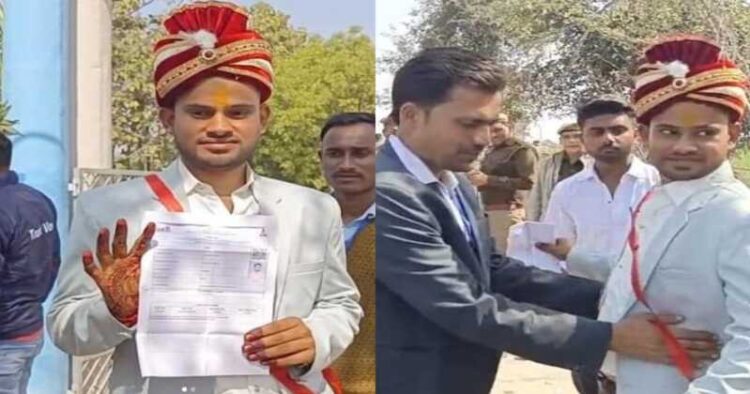In a striking show of dedication, a groom in Uttar Pradesh made headlines as he veered away from his wedding festivities to appear for his police constable exam, amidst the grandeur of his baraat. This unorthodox decision ignited a flurry of reactions on social media, underscoring the intersection of personal ambition and cultural expectations in contemporary society.
The groom’s unprecedented move, which saw him adorned in traditional wedding attire with henna-decorated hands, drew both admiration and criticism from netizens. While some lauded his dedication to his career, others questioned the ostentatious nature of his actions.
The convergence of joyous celebrations with the solemnity of a professional examination serves as a poignant reminder of the evolving priorities in today’s world. It prompts contemplation on the delicate balance between upholding tradition and embracing progress, magnified by the pervasive influence of social media on public opinion.
The news of this extraordinary event spread rapidly across online platforms, with the groom’s photo circulating widely. All India Radio News shared the story, detailing how the groom paused his procession to prioritise his professional aspirations over marital obligations.
Upon reaching the examination centre, the groom was welcomed by police personnel who commended his commitment to his career.
Expressing his belief in the importance of his professional endeavours, he proceeded to take the exam without hesitation. Following the conclusion of the test, he departed directly from the centre, bidding farewell to his wedding party.
Online reactions to the groom’s actions were varied, reflecting the diverse perspectives of internet users. While some praised his dedication, others criticised it as a mere spectacle, suggesting he could have changed his attire before heading to the exam centre.
Commentary on social media ranged from practical observations to philosophical reflections. One commenter pointed out the simplicity of changing attire, while another highlighted the competitive landscape of job opportunities, emphasising the significance of hard work in securing employment.
As the groom’s unconventional decision continues to reverberate online, it serves as a catalyst for broader discussions on the delicate balance between tradition and modernity, resonating with individuals navigating similar intersections in their own lives.




















Comments